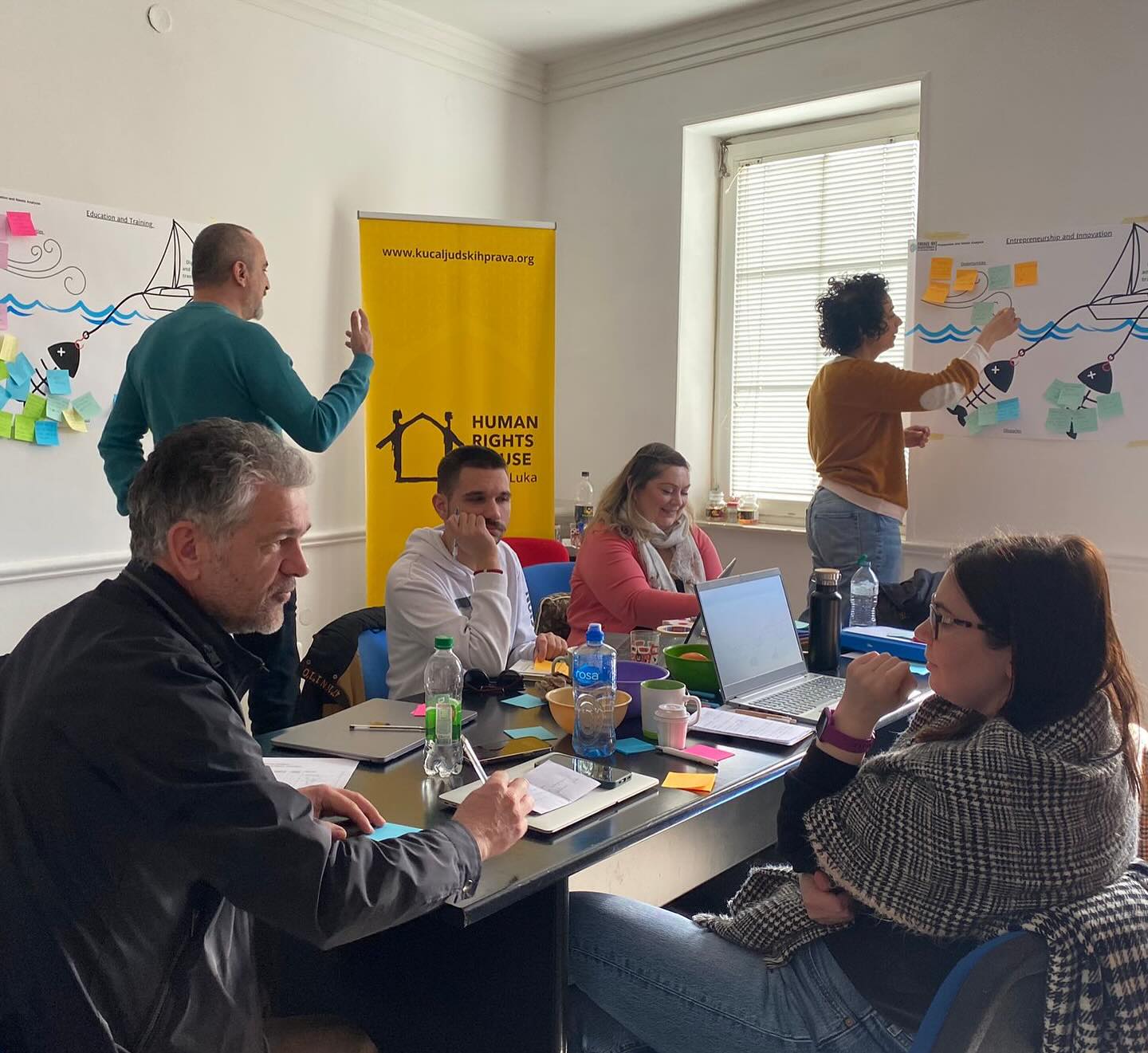As part of cooperation with journalists within the project “Citizens in the Fight against Silent Corruption”, we bring you a collaboration with the Discriminacija.ba portal and a text on the topic of sexual extortion, with the title “Sexual Extortion: The Silenced Violence”.
Research by the Helsinki Citizens’ Assembly Banja Luka showed that sexual extortion most often occurs at the workplace.
Namely, the perpetrators of sexual extortion condition the victims with resignation or promise them a promotion at work, attractive business trips, and threaten, for example, by showing explicit content to the victims’ spouses, etc., in exchange for sexual gain.
“My boss told me that I will be promoted to a better job if I send him a few of my intimate pictures”, is an example of sexual extortion or, more precisely, the term sextortion, which, in addition to forms of sexual extortion, also includes the misuse of explicit photos and videos of the victim.
Women are most often the victims of gender-based violence, but when it comes to sexual harassment and extortion, men can also be victims. This was also demonstrated through the work of the Association of Citizens “Stop Mobbing” from Trebinje, whose address receives reports related to sexual harassment and sexual extortion in the workplace.
The president of this association, Anica Ramić, explained in an interview with Discriminacija.ba that a case was reported to the association where three employers first sexually harassed a young woman, and later moved on to sexual extortion. After the intervention of the association and the submission of a report by the victim to the director of the company, the perpetrators were removed from the chief positions they held. The case, she says, ended there, without filing criminal charges.
“Reports came from women who are victims, but we also had a report from an employed male worker who complained about sexual blackmail by his boss,” Anica Ramić, the president of this association, told Discriminacija.ba.
However, due to gender inequality and culturally determined roles in Bosnia and Herzegovina (BiH), men and women experience sexual extortion in different ways. While women see sexual extortion as a threat, men, as Ramić says, are not afraid that “a woman’s excessive sexual interest will threaten their status at work.” Men, compared to women, less often decide to report such cases, seek help and have a harder time talking about the experience.
*************
For the purpose of writing this text, we discussed sexual extortion with an expert in domestic violence and violence against women, the author and co-author of numerous analyzes in the field of domestic violence and violence against women, and an educator within the education for working with victims of violence and for implementing protective measures of psychosocial treatment of perpetrators of violence, Fatima Bećirović.
For Discriminacija.ba, Bećirović explains that in the context of sexual extortion in the workplace, it is very important to understand the gravity of the “superior-subordinate” relation situation, which is why victims generally find it difficult and rare to decide to report such cases due to the presence of fear, insecurity and ignorance of the fact that these are elements of a criminal offense.
In particular, says Bećirović, there is “fear due to the influence of a violent person and his threats, which are often combined with harassment”.
Speaking about sexual extortion in the workplace, she points out that vulnerable people who need work and who are going through some difficult life situations are particularly exposed to the same. These can be divorced mothers with small children, young girls, members of certain minority communities (Roma, LGBTI persons and others), who, in fear of losing their jobs, suffer violence for years without daring to report it.
“Perpetrators know how to assess this very well, they are aware of their position of power and the difficult position of the victim, and they take advantage of this in a targeted and conscious way, convincing them that consenting to some sexual activity can improve their difficult situation,” says Bećirović.
A vicious circle
Bećirović explains that sexual harassment, in general, starts from the moment of communication with a sexual connotation when the person towards whom such communication is directed feels discomfort, when he/she does not like the way someone treats him/her, when he/she starts to feel insecure and wants this type of communication and contact to stop.
In cases of sexual extortion in the workplace, she says, at the beginning there may be less dangerous or less serious situations that may be the first signals such as “e.g. in situations when a superior person asks for certain information from private life, when he/she promises certain things that can be significant for career promotion, but sets certain conditions that initially do not have to have all these elements”.
After that, Bećirović points out, there can be more serious blackmail that has all the aforementioned elements of sexual extortion and can go “in the direction of more serious harassment and extortion, and it is very easy to enter a vicious circle.”
All of this, she says, represents a serious threat to basic human rights and an attack on a person’s dignity, where the victims first of all experience fear, but also a series of symptoms that point to a serious impairment of their health.
How to protect yourself?
Sexual extortion, as Bećirović explains, can be linked to other criminal acts that are prescribed by state, entity and Brčko District laws, namely: the Law on Gender Equality in BiH, the Law on Civil Service of BiH, as well as criminal laws and labour laws of BiH, Federation of BiH, Republic of Srpska and Brčko District.
Bećirović says that every case of sexual violence should be reported and punished, and that the punishment should be greater, proportionate and appropriate to the crime. Although sexual extortion is not recognized as a separate criminal offense in BiH, Bećirović points out that the existing laws are quite good, but the problem is their inconsistent application and mild criminal policy, as well as the need to be fully harmonized with international regulations adopted and ratified by BiH.
“That is why I believe that we should work on improving the more consistent application and implementation of existing legal solutions, because the mere amendment of a law will not necessarily bring about a change in practice if we continue to implement legal solutions in this way,” says Bećirović.
She also pointed out that a clearer definition of sexual extortion as a criminal offense would “significantly improve the possibility of reporting and punishing, but also the prevention of such crimes”.
Vesna Iliktarević from the Helsinki Citizens’ Assembly Banja Luka, which implements the campaign “Sexual Extortion is Corruption. Let’s Break the Silence!” says that it is about “silent” corruption, which is why we need to talk as much as possible about sexual extortion in public and to additionally inform citizens about this problem through various activities and campaigns.
“Our goal is to educate citizens about the concept of sexual extortion, which happens in both the public and private sector, but also to advocate the incorporation of the concept of sexual extortion into legal policies and anti-corruption strategies,” says the representative of the Helsinki Citizens’ Assembly.
Anica Ramić, president of the Trebinje association, says that the fastest way to stop sexual extortion from a position of power is for the victim to report the perpetrator immediately after the act has been committed.
*******
This activity was implemented within the project “Citizens in the Fight against Silent Corruption”, which is part of the wider program “Support to Citizens in the Fight against Corruption”, implemented by CCI, with the financial support of USAID. The content is the sole responsibility of the Helsinki Citizens’ Assembly Banja Luka and does not necessarily support the views of USAID or the United States Government.
Photo: Unsplash





